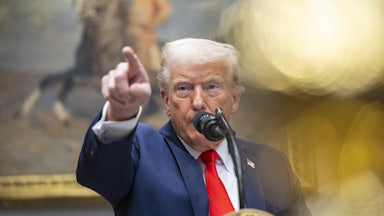Richard Nixon and his Madison Avenue handlers invented the modern political culture war. Running for office in 1968, Nixon drew on his grudges against the East Coast elites and the liberal media, finding that such resentment resonated with many Americans. He exploited racism and fueled white fears about crime and chaos, a playbook that defines Republican politics to this day. As president, he exploited mainstream America’s suspicion of hippies, calling drug legalization crusader Timothy Leary “the most dangerous man in America.” Three days before National Guard members killed student protesters at Kent State University, Nixon described antiwar demonstrators as “bums blowing up the campuses.” He fueled rumors about homosexuality in the press corps. He created and fanned a panic about drug use to vilify Black people and antiwar protesters, leaving a legacy of punitive and ineffective drug policy that is also, tragically, still with us. His administration helped coordinate construction workers’ violent riots against those protesting the Vietnam War and invited the rioters to the White House, promulgating the now-discredited idea that the Vietnam War represented a cultural divide between “hard hats” and “hippies.”
Why didn’t he do the same with the environmental movement? You’d think it would have been a goldmine for him: Imagine the potentially polarizing imagery of the long-haired tree huggers coming for the silent majority’s two-car-garage way of life.
But although these days climate policy has joined Drag Queen Story Hour as a hot trigger for right-wing obsession, Nixon didn’t give environmentalism the culture-war treatment. In fact, he was the most environmentalist U.S. president ever.
Nixon declared the first-ever Earth Day, on April 22, 1972. That year he also created the Environmental Protection Agency and signed the Clean Water Act. In 1973, he signed the Endangered Species Act, or ESA, legislation which he had requested from Congress and of which he was the major champion. “Nothing is more precious and worthy of preservation than the rich array of animal life with which our country has been blessed,” he said, announcing the bill.
Perhaps even more jarring to our modern political expectations, Nixon’s support for Earth Day and for the planet was not iconoclastic among Republicans. While the original congressional resolution to create Earth Day came from Wisconsin Democrat Gaylord Nelson, the resolution was co-sponsored by California Republican Pete McCloskey.* The 1968 Republican Party platform called for an expansion of urban green spaces and of our natural parks, declaring that “our nation must pursue its activities in harmony with the environment.… We must be mindful of our priceless heritage of natural beauty.”
That’s not to say that Nixon personally embraced the environmental movement. He did not campaign on environmental issues, and, privately to Henry Ford II, he worried, vividly, that the movement wanted humans to go back to living like “a bunch of damned animals.” But despite his ideological differences with aspects of environmentalism—and unease with it—he presided over the biggest expansion of federal environmental protections ever.
One way to explain this is that Nixon’s presidency coincided with a groundswell of environmentalist fervor, with membership in the Sierra Club tripling between 1965 and 1970, and the share of the American electorate believing that pollution was a serious problem going from one-third to 70 percent during that same period. So, while the tension between businessmen and “tree huggers” existed during Nixon’s time, there was nothing to be gained politically from exploiting it: Environmentalism was popular, and Nixon responded to the moment.
The environment became a more partisan economic issue in the 1980s and ’90s, with businesses vociferously opposing regulation. So, perhaps it’s unsurprising that subsequent Republican presidents with perhaps stronger personal environmental sympathies never reached Nixon’s level of environmental policymaking, although they did support limited environmental initiatives. Both Presidents Bush arguably fall into this category: George H.W. Bush solved the acid rain problem, and George W. Bush, while he disgracefully killed the Kyoto Protocol treaty, protected wetlands and maintained that his administration took “the issue of global climate seriously,” a far cry from Trump’s war on even the smallest efforts at decarbonization, including LED light bulbs and low-flow showerheads.
It’s been mostly in this century that the fossil fuel industry, a longtime supporter of Republicans, has promoted climate as a culture-war issue, with conservative politicians eager to play along. The current effort to stigmatize all environmentally conscious investing as “woke,” for example, comes from fossil fuel–supported organizations like the Texas Public Policy Foundation as well as from right-wing leaders eager for attention.
This approach has spread like wildfire: Last month, Senator Josh Hawley even incoherently blamed the Silicon Valley Bank failure on “wokeness”—rather than its numerous, more pedestrian red flags. Conservatives now consider climate a rich source of cultural skirmish, stoking panic that the government is coming for our gas stoves and hamburgers. (These culture-war narratives too, it’s worth noting, are backed by powerful corporate interests in the form of the gas lobby and meat industry.) There’s an alarming intensity to such misperceptions: An urban planner who has advanced the idea that we should be able to walk or bike to our daily destinations in 15 minutes is now receiving death threats from people who see a conspiracy to impose “climate change lockdowns” and turn our cities into prison camps.
We can’t undo the recent right-wing propagandizing and disinformation and go back to Nixon’s time. But it’s worth considering how we wrest climate from the divisive brain-suck of the culture wars. In the late ’60s and ’70s, appeals to the universality of our love for nature, and to Americans’ patriotic desire to conserve what’s beautiful and best about America, were effective. These narratives are still powerful.
We also now have a storyline that wasn’t so prominent in Nixon’s time: environmentalism as economic self-interest. Nixon saw jobs and the environment as conflicting obligations to balance; he privately told advisers that he thought “jobs” were more important than the environment but wanted to “keep … out of trouble” with the environmental movement. The contemporary environmental movement has tried to move past that tension. To Biden’s credit, his most successful climate legislation, the Inflation Reduction Act and the infrastructure bill, reflect a positive vision of what decarbonization could do for workers and the economy—that’s one reason both policy moves have been so popular.
These rhetorical and practical evolutions can help. But the biggest lesson of Nixon’s time is that a huge political movement can shape the political culture, allowing even the most hardened right-wing culture warrior to find their inner tree hugger.
There are signs that this could happen again. Republicans in our current Congress appear deeply committed to their nonsense, but this crazy moment may pass. Public opinion polling shows many Republican voters are concerned about climate, willing to support environmental legislation, and buying electric cars. And now that the funding for the IRA is starting to come through, it’s benefiting the districts represented by the same Republicans who resisted it so hard (even more than Democratic districts). In a comical twist, those congresspeople are now boasting about the IRA money to their constituents, just as many Republicans who didn’t vote for the 2021 “bipartisan” infrastructure bill did. They’re doing that not because they’ve had a change of heart on climate change after watching An Inconvenient Truth or reading this magazine, but because the policies are popular. Just like Nixon, they still hate the hippies—but they see which way the wind is blowing.
* This article originally misidentified the state Nelson represented in the Senate.










